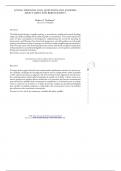LIVING THROUGH LOSS: QUESTIONS AND ANSWERS
ABOUT GRIEF AND BEREAVEMENT
Robert A. Neimeyer*
University of Memphis
Abstract
The field of grief therapy is rapidly evolving, as new theories, models and research findings
inspire new understandings of loss and how people accommodate it. This article summarizes
some of these contemporary developments, emphasizing the search for meaning in
bereavement, and illustrates how these fresh perspectives can offer guidance to real people
seeking consultation on how to manage very real losses under complicating circumstances.
Nurses occupy many roles that bring them into contact with death and grief, leaving them
well positioned to extend knowledgeable and compassionate care for patients and families
facing such existential transitions.
Keywords: nurses’s role, grief, bereavement care, loss.
VIVIENDO EL DUELO: PREGUNTAS Y RESPUESTAS
SOBRE LA PÉRDIDA Y EL DUELO
Resumen
13
El campo de las terapias de duelo está evolucionando rápidamente, mientras las nuevas teo-
rías, modelos y hallazgos de investigación inspiran nuevas comprensiones sobre la pérdida
REVISTA CUIDAR, JUNIO 0; 2020, PP. 13-25
y sobre cómo las personas se adaptan a ella. Este artículo resume algunos de estos desarro-
llos contemporáneos enfatizando la búsqueda de sentido en el duelo, e ilustra cómo estas
nuevas perspectivas pueden ofrecer orientación a las personas que buscan asesoramiento
para enfrentar las pérdidas bajo circunstancias complicadas. Las enfermeras por su trabajo
están en contacto con la muerte y el dolor, por lo que ocupan una posición privilegiada
para extender el cuidado compasivo e informado tanto a lo pacientes como a las familias
que enfrentan tales transiciones existenciales.
Palabras clave: rol de las enfermeras, cuidados del duelo, pérdida.
DOI: https://doi.org/10.25145/j.cuidar.2020.00.02
Revista Cuidar, 0; junio 2020, pp. 13-25; ISSN: 2660-4426
, The publication of an important new journal in the field of nursing is a wel-
come development, given the vast range of roles that nurses play in caring for chil-
dren and adults, in settings that range from delivery rooms and neonatal intensive
care units through emergency departments and surgical theatres to geriatric facili-
ties and palliative care services. And because many of these settings are liminal envi-
ronments in which life meets with death, despite the best efforts at treatment pro-
vided by the interdisciplinary team, it is equally welcome that this inaugural issue
is devoted to end-of-life care and bereavement. My modest goal in this brief arti-
cle is to suggest the relevance of contemporary psychological theory, research and
practice to nursing care in such contexts, particularly for those nurses engaged in
patient education, family oriented practice, and roles that encourage not only tech-
nical competence in providing care for ailing bodies, but also care for the human
beings who suffer emotionally and spiritually in anticipation of or in response to
the death of a member of the family, and who require more than the competent
administration of medication and comfort care.
Specifically, I will briefly sketch three current theories of grief that are
supported by a growing evidence base, and that carry important implications for
bereavement care, whatever the discipline of the practitioner. I will then break with
academic convention and engage not other researchers, but rather the mourners
themselves, and the nurses and other professionals who work directly with them.
To do so I will draw upon the large trove of questions that both groups have direc-
ted to me for consultation, and share my responses to each in an unedited man-
ner. This means that I have endeavored to speak compassionately but knowledgea-
bly as a bereavement scholar, and also plainly and practically as a counselor with
one small window of opportunity to offer consolation, perspective and actionable
14
advice to people who greatly, often desperately, need it.1 In doing so, I will avoid
the usual custom of extensive scientific justification of points made, although I will
REVISTA CUIDAR, JUNIO 0; 2020, PP. 13-25
offer advice that is compatible with both the burgeoning research literature and with
my 40 years of working alongside the bereaved as a grief therapist in the wake of
life-altering loss. I hope that the responses provide perspective and encouragement
for the readers of this journal as well, as they too commonly have only brief, but
potentially profound, opportunities to extend to patients and their families useful
professional companioning at this critical juncture.
* PhD. University of Memphis, USA and Portland Institute for Loss and Transition.
Address correspondence to neimeyer@portlandinstitute.org.
1
The source of these questions and answers is AfterTalk (www.aftertalk.com), an innovative
grief support site that offers expressive writing tools, inspirational quotes and hospice-oriented
resources for memory archiving, all as free services to mourners and the professionals working with
them. My “Ask Dr. Neimeyer” advice column on that site has proven to be one of its most frequently
accessed features, and speaks to the great need of families for informed and compassionate guidance
through life’s most troubling transitions.




